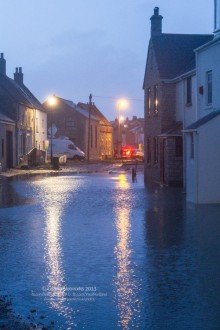Be careful what you wish for, as my nan used to say.
Now, I know that the comments section under almost any story on any news media tends to be the playground of the trolls, the tormented and the downright potty, but whenever public services are mentioned in *one* local newspaper there seems to be a queue of armchair politicos lining up to rail against “bloated public services”, “gold-plated public sector pensions”, “wasteful bureaucracies” and “unelected quangos.”
Cut it all back, cut this unaffordable spending, and – preferably – cut our taxes seems to be the basic message. Under this government, there are signs that some (at least) of their dreams have come true, and we have seen an unprecedented assault on public spending, and therefore public services and investment – all in the name of deficit reduction and reducing the national debt.
The problem is, that at times such as those we are encountering now – with national emergency, floods and a crumbling infrastructure clearly exposed as inadequate – suddenly the cries are calling for an explanation of why the very services we need aren’t there. Well, we can’t have it all ways.
By this October, the Environment Agency which is clearly struggling to cope in the face of the worse rainfall on record will have lost 25% of its staff. Meanwhile, the Brass Neck award goes to Ian Liddell-Grainge, a Somerset Tory MP who is doing the rounds berating the Environment Agency, despite successfully campaigning in 2010 to ensure that a £20 million flood defence scheme for the county didn’t go ahead. In all, DEFRA cut £110 million from flood defence schemes.
And anyone who has ever travelled between Exeter and Plymouth must have thought to themselves, as they enjoyed the scenic but precarious train line at Dawlish, that surely this line could not be protected from tides, storms and landslides forever. Indeed, the need for a second, inland line had been recognised early in the 20th Century, but plans were delayed due to the onset of the Second World War.
What has been championed as “balancing the books” or “good housekeeping” is suddenly exposed as a false economy. What is the cost of the military now being drafted into Portland to shore up shingle banks because the Environment Agency has been slashed and coastal areas seen disinvestment? What is the economic cost to the south west while rail lines into the region lie broken, flooded, or both? What is the cost to the region’s farmers, to the insurance industry, or to the NHS as bacteria rises to unsafe levels in the floodwaters?
Meanwhile, the UK’s debt-to-GDP ratio is actually rising.

There is a reason public services are called public services. They benefit us all. They are paid for by us all.
No amount of belated touring and photo opportunities for Cameron and his ministers in flooded areas can hide the fact that we have services that are now overwhelmed, and infrastructure that is crumbling. Austerity has not worked, and now its impact is beginning to be exposed.
Today it is flood defences, but soon it will be road maintenance, policing, the NHS and education. Take your pick.
There is a difference between efficiency, fiscal discipline and best value, and the sort of naked slash-and-burn assault we are currently seeing on public services and investment. Austerity is not lowering the debt, but is leaving us with third-rate services that are simply not up to the job. Cameron has failed to get a grip of the floods crisis because he has failed to get a grip on his own departments and treasury.
For Portland, Somerset, Dawlish, and now Surrey and the Thames Valley, 2015 can’t come soon enough.
Simon Bowkett is the South Dorset Labour Prospective Parliamentary Candidate. Follow his campaign at www.simonbowkett.co.uk, and on Twitter @Simon_Bowkett







